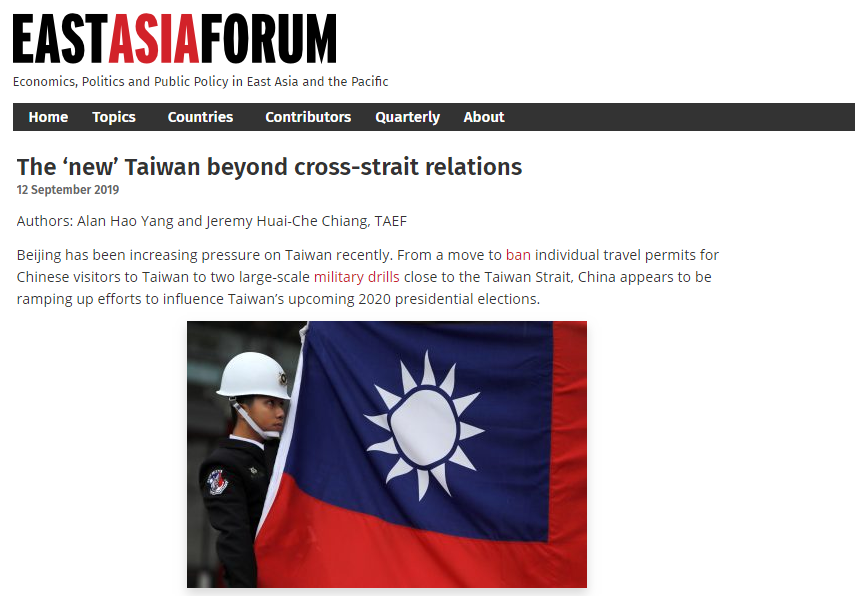Beijing has been increasing pressure on Taiwan recently. From a move to ban individual travel permits for Chinese visitors to Taiwan to two large-scale military drills close to the Taiwan Strait, China appears to be ramping up efforts to influence Taiwan’s upcoming 2020 presidential elections.
This is nothing new. Since Taiwanese President Tsai Ing-wen’s inauguration in 2016, China has not given Taiwan a day of rest in its battle to preserve autonomy. China’s diplomatic offensives have already cost Taiwan five allies, while Beijing’s ‘31 measures’ and other pro-unification incentives have polarised attitudes across the island towards its gigantic neighbour. Cyber operatives and grassroots United Front activities have also damaged Taiwan’s democracy.
Despite this pressure, a ‘new’ Taiwan has emerged that is increasingly willing to think beyond cross-strait mechanisms and to embrace a new regional role. This new Taiwan embodies progressive liberal values while seeking to display a stabilising role in the emerging Indo-Pacific theatre. This is not a sudden transformation but an incremental process that has been in the making for years.
Starting with its New Southbound Policy in 2016, Taiwan has been working relentlessly to expand ties with its southern neighbours. While Taiwan had similar policies before 2016, previous initiatives focused on traditional economic cooperation. The New Southbound Policy includes comprehensive engagement efforts in diverse areas. Taiwan has already set up agricultural demonstration farms and provided related technological training to local organisations in Indonesia, with the Philippines and Vietnam to follow.
Taiwan’s vibrant civil society has also contributed immensely in garnering domestic support for the policy, while also extending Taiwan’s outreach regionally. The New Southbound Policy is more ‘strategic and comprehensive’ than any of Taiwan’s previous policies directed towards Asia.
While Taiwan’s economic dependence on China continues, investment in China has been gradually slowing as a result of the US–China trade war. Taiwan’s total trade with New Southbound countries climbed from US$96 billion in 2016 to US$117.1 billion in 2018. The number of students in Taiwan also rose from 32,318 to 51,970 during the same period.
The New Southbound Policy has also made significant progress in tourism. Chinese tourists peaked at around 4.1 million in 2015 but have steadily declined after Tsai’s inauguration. In 2018, only 2.5 million Chinese tourists visited. Taiwan still had a record 11.07 million foreign visitors in 2018. A total of 2.42 million visits from Southeast Asia accounted for 21.89 per cent of 2018’s foreign visits. This increase of Southeast Asian visitors represented a remarkable growth of 13.8 per cent from 2017.
Taiwan and the United States are also enjoying their warmest ties in decades. The Trump administration’s Indo-Pacific strategy shares similar goals with Taiwan’s New Southbound Policy and both sides are eager to cooperate. Various new pieces of US legislation, such as the Taiwan Assurance Act of 2019, have also confirmed Washington’s commitment to the island’s security and democracy. US President Donald Trump has approved a US$2.2 billion arms sale to Taiwan, while the administration is also moving forward with a US$8 billion sale of 66 F-16V fighter jets.
With bipartisan support for toughened competition with China emerging in the United States, Taiwan’s strategic importance has steadily increased. Tsai’s administration has taken full advantage of this trend, adopting multiple measures to strengthen the island’s role as not only one of the leading liberal democracies in Asia but also a critical security partner in the Indo-Pacific. Taiwan’s relations with like-minded countries such as Japan and India are also showing similar positive trends.
Besides these prominent international efforts, there are also several interesting dynamics unfolding on the island itself. As the trade war continues to create ruptures throughout existing global supply chains, low-end production by Taiwanese firms is moving into Southeast Asia, while high-end manufacturing firms are considering relocating back to Taiwan. The Ministry of Economic Affairs has approved investment this year valued around US$16.03 billion for Taiwanese firms seeking to return. If these investments materialise, they might provide key stimulus for the industrial sector and middle-level technical vocations for locals. They might also assist in lessening Taiwan’s engagement with Chinese-led production networks.
Taiwan’s cultural power is also growing. Despite being shadowed by the Korean Hallyu, Taiwan has been trying to restore its status as one of Asia’s leading pop culture hubs. Since Cheng Li-chiun’s inauguration as Taiwanese Minister of Culture in 2016, official cultural agencies and civil organisations have taken up a more proactive role. Local independent bands have now gone global and award-winning Taiwanese television dramas are once again winning the hearts of audiences in Asia and beyond. The Cultural Content Institute has also pledged to assist in developing Taiwan’s cultural content industry.
Taiwan needs public diplomacy that can engage more stakeholders across the globe. In an era where public opinion drives foreign policy, Taiwan has recognised the need to be more visible. This recognition is also a key characteristic of the ‘new’ Taiwan, a Taiwan that is contemplating fresh strategies towards an increasingly hostile China.
Alan Hao Yang is Executive Director of the Taiwan-Asia Exchange Foundation (TEAF), Deputy Director of the Institute of International Relations and Executive Director of the Center for Southeast Asian Studies at National Chengchi University, Taiwan.
Jeremy Huai-Che Chiang is a Non-Resident Research Associate at the Taiwan-Asia Exchange Foundation (TAEF).
This article was originally published on EASTASIAFORUM.
